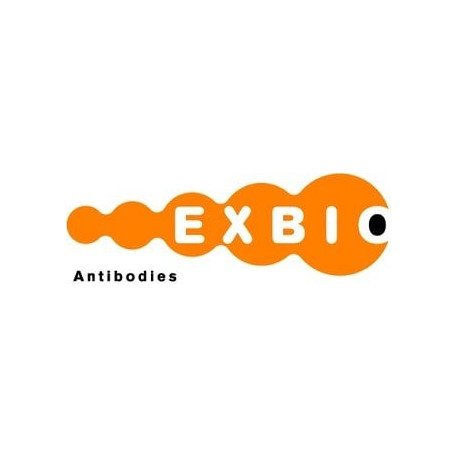Cart 0 Product Products (empty)
No products
To be determined Shipping
0,00 € Total
Prices are tax excluded
Product successfully added to your shopping cart
Quantity
Total
There are 0 items in your cart. There is 1 item in your cart.
Total products (tax excl.)
Total shipping (tax excl.) To be determined
Total (tax excl.)
Data sheet of Mouse Monoclonal to CD3
| Brand | Exbio |
| Product type | Primary antibodies |
| Reactivity | Human |
| Clonality | Monoclonal |
More info about Mouse Monoclonal to CD3
| Brand: | Exbio |
| Product no.: | 11-631-C100 |
| Product type: | Primary antibodies |
| Host species: | Mouse |
| Product name: | Mouse Monoclonal to CD3 |
| Antigen: | CD3 |
| Clonality: | Monoclonal |
| Clone: | OKT3 |
| Isotype: | IgG2a |
| Immunogen: | Commercially sensitive information_x000D_ |
| Format: | purified |
| Specificity: | The mouse monoclonal antibody OKT3 recognizes the CD3 antigen of the TCR/CD3 complex on mature human T cells. This antibody, also known as Orthoclone OKT3 or Muromonab-CD3, has been extensively used as a drug for therapy of acute, glucocorticoid resistant rejection of allogenic renal, heart and liver transplants. It has also been investigated for use in treating T-cell acute lymphoblastic leukemia. _x000D_ _x000D_ HLDA VI; WS Code T6T-R3 |
| Categories: | CD and Related Antigens (Human) |
| Concentration: | 1 mg/ml |
| Storage buffer: | Phosphate buffered saline (PBS) with 15 mM sodium azide, approx. pH 7.4 |
| Storage / stability: | Store at 2-8°C. Do not freeze. Do not use after expiration date stamped on vial label. |
| Background: | CD3 complex is crucial in transducing antigen-recognition signals into the cytoplasm of T cells and in regulating the cell surface expression of the TCR complex. T cell activation through the antigen receptor (TCR) involves the cytoplasmic tails of the CD3 subunits CD3 gamma, CD3 delta, CD3 epsilon and CD3 zeta. These CD3 subunits are structurally related members of the immunoglobulins super family encoded by closely linked genes on human chromosome 11. The CD3 components have long cytoplasmic tails that associate with cytoplasmic signal transduction molecules. This association is mediated at least in part by a double tyrosine-based motif present in a single copy in the CD3 subunits. CD3 may play a role in TCR-induced growth arrest, cell survival and proliferation._x000D_ The CD3 antigen is present on 68-82% of normal peripheral blood lymphocytes, 65-85% of thymocytes and Purkinje cells in the cerebellum. It is never expressed on B or NK cells. Decreased percentages of T lymphocytes may be observed in some autoimmune diseases. |
| Purity: | > 95% (by SDS-PAGE) |
| Purification: | Purified by protein-A affinity chromatography |
| Product specific references: | *Li T, Wong VK, Yi XQ, Wong YF, Zhou H, Liu L: Matrine induces cell anergy in human Jurkat T cells through modulation of mitogen-activated protein kinases and nuclear factor of activated T-cells signaling with concomitant up-regulation of anergy-associated genes expression. Biol Pharm Bull. 2010 Jan;33(1):40-6._x000D_ , *Gordon PR, Leimig T, Mueller I, Babarin-Dorner A, Holladay MA, Houston J, Kerst G, Geiger T, Handgretinger R: A large-scale method for T cell depletion: towards graft engineering of mobilized peripheral blood stem cells. Bone Marrow Transplant. 2002 Jul;30(2):69-74._x000D_ , *Schlegel PG, Eyrich M, Bader P, Handgretinger R, Lang P, Niethammer D, Klingebiel T: OKT-3-based reconditioning regimen for early graft failure in HLA-non-identical stem cell transplants. Br J Haematol. 2000 Nov;111(2):668-73._x000D_ , *Lang P, Handgretinger R, Niethammer D, Schlegel PG, Schumm M, Greil J, Bader P, Engel C, Scheel-Walter H, Eyrich M, Klingebiel T: Transplantation of highly purified CD34+ progenitor cells from unrelated donors in pediatric leukemia. Blood. 2003 Feb 15;101(4):1630-6._x000D_ , *Trushin SA, Bren GD, Asin S, Pennington KN, Paya CV, Badley AD. Human immunodeficiency virus reactivation by phorbol esters or T-cell receptor ligation requires both PKCalpha and PKCtheta. J Virol. 2005 Aug;79(15):9821-30._x000D_ , *Quintana A, Schwindling C, Wenning AS, Becherer U, Rettig J, Schwarz EC, Hoth M: T cell activation requires mitochondrial translocation to the immunological synapse. Proc Natl Acad Sci U S A. 2007 Sep 4;104(36):14418-23._x000D_ , *Undale AH, van den Elsen PJ, Celis E: Antigen-independent acquisition of MHC class II molecules by human T lymphocytes. Int Immunol. 2004 Oct;16(10):1523-33._x000D_ , *Guven H, Gilljam M, Chambers BJ, Ljunggren HG, Christensson B, Kimby E, Dilber MS: Expansion of natural killer (NK) and natural killer-like T (NKT)-cell populations derived from patients with B-chronic lymphocytic leukemia (B-CLL): a potential source for cellular immunotherapy. Leukemia. 2003 Oct;17(10):1973-80._x000D_ , *Katayose Y, Kudo T, Suzuki M, Shinoda M, Saijyo S, Sakurai N, Saeki H, Fukuhara K, Imai K, Matsuno S: MUC1-specific targeting immunotherapy with bispecific antibodies: inhibition of xenografted human bile duct carcinoma growth. Cancer Res. 1996 Sep 15;56(18):4205-12._x000D_ , *Smith SL: Ten years of Orthoclone OKT3 (muromonab-CD3): a review. J Transpl Coord. 1996 Sep;6(3):109-19; quiz 120-1._x000D_ , *And many other._x000D_ |
| Related products: | - Mouse Monoclonal to CD3 zeta (Phospho-Tyr142) - Mouse Monoclonal to CD3 activation epitope - Mouse Monoclonal to CD3 zeta (Phospho-Tyr111) |
| Shipping condition: | Room temperature |


